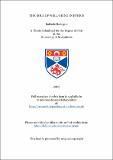The role of well-being in ethics
Abstract
In this thesis I assess the role of well-being in ethics. In order to do so I reply to a threefold charge against the importance of well-being in ethics. In What We Owe to Each Other Scanlon argues (1) that the concept of well-being plays very little role in the thinking of an agent; (2) that no unified theory of well-being can be found; (3) that welfarism is false. In Part I, I argue that the concept of well-being does play an explanatorily and justificatorily important role in the thinking of a rational agent. I arrive at this conclusion by distinguishing levels of thinking activity as well as by considering the implicit rather than explicit role well-being plays in our deliberation. I conclude this part of the thesis by illustrating the relation between the idea of well-being, its parts and its sources. In Part II, I put forward a unified theory of well-being and I do so by taking on board with a slight modification Scanlon's own buck-passing account of value. I argue that something is a part of a person's good if, and only if, there is reason for this person to desire it. I claim that this account does not fall prey to the 'scope problem'. I also discuss a number of different though connected issues such as the defence of the claim that well-being is itself a normative notion and issues concerning the various parts of well-being. In Part III, I begin to sketch the normative role of well-being both first-personally and impartially. With Scanlon, I agree that welfarism is false. Yet, I argue in favour of a moderate form of welfarism, a view that takes a positive function of each individual's well-being to afford the ultimate criterion of practical reason.
Type
Thesis, PhD Doctor of Philosophy
Collections
Items in the St Andrews Research Repository are protected by copyright, with all rights reserved, unless otherwise indicated.

